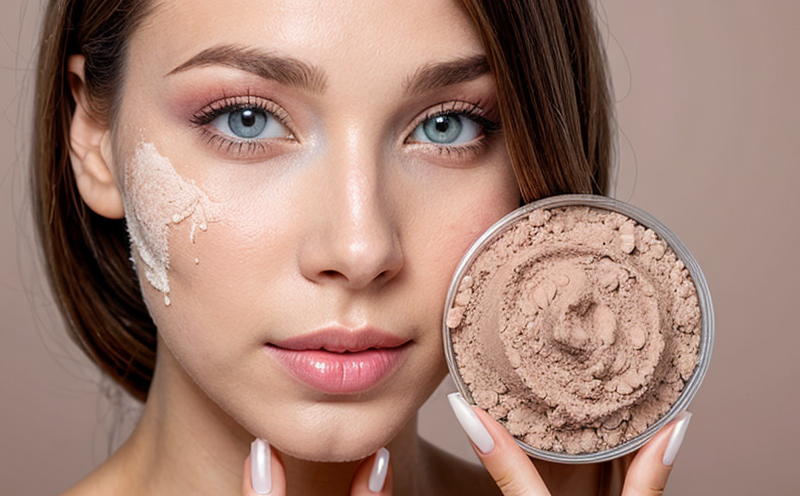Formaldehyde Allergen Testing in Cosmetic Products
In the realm of cosmetics and personal care products, ensuring product safety is paramount. Formaldehyde allergen testing plays a critical role in safeguarding consumer health by identifying potential sensitizers that could trigger allergic reactions or dermatitis. This service involves meticulous laboratory analysis to ensure compliance with stringent international standards such as ISO 10993-18:2016 and FDA guidelines.
Formaldehyde is widely used in cosmetics for its preservative properties, but it can also be a significant allergen. The testing process typically includes the extraction of formaldehyde from cosmetic samples using methods like solid-phase extraction (SPE) followed by quantification through high-performance liquid chromatography (HPLC). This ensures accurate measurement and identification of even trace amounts.
Our formaldehyde allergen testing service is designed to provide comprehensive analysis, offering detailed reports that include concentration levels and potential risk assessments. Compliance with regulatory standards is essential for manufacturers, especially when formulating new products or reformulating existing ones. Our team of experts ensures that every test adheres to the latest guidelines, providing peace of mind to our clients.
The importance of this testing cannot be overstated. It helps in preventing product recalls and protecting brand reputation by ensuring that no allergens are present at levels that could cause harm. Additionally, it supports the development of safer products that meet global regulatory requirements.
In summary, formaldehyde allergen testing is a crucial step in the cosmetic manufacturing process. By leveraging our advanced techniques and expertise, we ensure that every product undergoes rigorous analysis to identify potential sensitizers effectively. This service not only enhances consumer safety but also supports ethical business practices within the industry.
| Sample Type | Test Method | Expected Turnaround Time |
|---|---|---|
| Cosmetic Lotions and Creams | Solid-Phase Extraction (SPE) followed by HPLC | Average of 7 days |
| Mascara and Eye Shadows | Micro-sampling with SPE | 5 to 10 working days |
| Hair Care Products | Solid-phase micro-extraction (SPME) | 7-10 business days |
Eurolab Advantages
At Eurolab, we pride ourselves on offering unparalleled services that go beyond standard compliance. Our state-of-the-art facilities and cutting-edge technology ensure accurate results every time. Here are some of the key advantages:
- Comprehensive Testing Capabilities: We cover a wide range of cosmetic ingredients and formulations.
- International Expertise: Our team is well-versed in international standards, ensuring global compliance.
- Quick Turnaround Times: Efficient processes mean faster results for our clients.
- Custom Solutions: Tailored services to meet specific client needs and project requirements.
In addition to these technical benefits, Eurolab also prioritizes customer satisfaction. Our dedicated team ensures clear communication throughout the testing process, offering support from sample submission to final report delivery.
Environmental and Sustainability Contributions
Eurolab is committed to promoting environmental responsibility within our services. By ensuring that formaldehyde allergen testing is conducted accurately and efficiently, we contribute positively to the industry's sustainability efforts. Our approach not only protects consumer health but also supports the development of environmentally friendly products.
Through rigorous testing and adherence to strict standards, we help manufacturers reduce unnecessary waste and minimize environmental impact. Our commitment extends beyond individual tests; it encompasses a broader ethos of ethical business practices that align with global sustainability goals.
Use Cases and Application Examples
- New Product Development: Testing ensures that new formulations do not contain harmful sensitizers.
- Batch Release: Ensures each batch meets quality standards before release to market.
- R&D Projects: Supports ongoing research and development efforts in formulating safer products.
- Compliance Audits: Provides evidence of adherence to regulatory requirements for audits.
| Product Type | Potential Risks Identified | Consequences |
|---|---|---|
| Creams and Lotions | Formaldehyde, formaldehyde-releasing agents | Dermatitis, allergic reactions |
| Hair Dyes | Formaldehyde | Skin irritation, cancer risk (in high doses) |
| Mascara | Formaldehyde-releasing agents | Allergic reactions, eye irritation |





